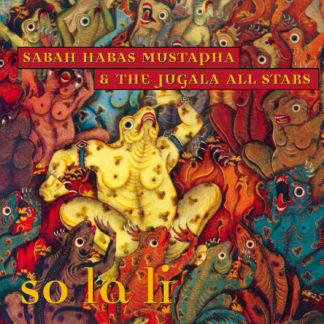Sabah Habas Mustapha
Sabah Habas Mustapha is the young sibling of the famous pioneer family orchestra the 3 MUSTAPHAS 3.
After the apparently legendary worldmusic family orchestra the 3 Mustaphas 3 mysteriously terminated their public appearances in 1991, bass player and singer Sabah Habas Mustapha travelled to Indonesia looking to learn more about the myriad (and largely unknown in the west) musical styles that had fascinated him for so long. An invitation to record in Jakarta led to the composition of the song “Denpasar Moon” which, to his complete surprise, became a million-seller, spawning dozens of cover-versions. Following on from that success, Sabah recorded an album — now remastered and reissued in an expanded version with video and extra tracks.
In 1997 he returned to Indonesia, this time to Bandung, the capital of the West Javanese province of Sunda, to record an album in Gugum Gumbira’s famous Jugala studios. This album, Jalan Kopo, featured some of the finest young players on the Bandung traditional music scene, namely: Ismet Ruchimat, who plays the zither-like kacapi, Agus Supriawan, who plays the khendang – a large double-headed drum played with hands and feet, together with three smaller drums known as ketipung – Asep Maung on the bamboo flute (suling) andYadi Piteuk on violin. Thus were born THE JUGALA ALLSTARS.
Sabah Habas recalls: “Jalan Kopo was basically a collection of my songs which Ismet, Agus, Asep and Yadi played on in a session-player role. After we finished the recording we carried on jamming together and it was clear that this would be a really exciting direction to explore further.”
The breakthrough came in 1999 when, with the addition of singer Tati Yani Mugiono and second khendang player Zenir, the Jugala Allstars assembled in On Studios in Bandung to begin work on the album So La Li: “This time I wanted it to be a real group effort”, says Sabah Habas, “I had a couple of basic ideas and Ismet brought two of his compositions and we worked on those first. As the sound began to take on an identity of its own the rest came about through us all improvising in the studio. Once we had the instrumental structures worked out we brought in Tati Yani to sing some traditional Sundanese texts which we had adapted for our arrangements.”
Since its release in May 2000 “So La Li” has received critical acclaim in Europe and North America and has been in the EBU World Music Charts for three months.
Showing all 2 results
-
Not Available

Sabah Habas Mustapha – So La Li
$12.00 Read more -
Not Available

Sabah Habas Mustapha – Jalan Kopo
$12.00 Read more
Showing all 2 results
